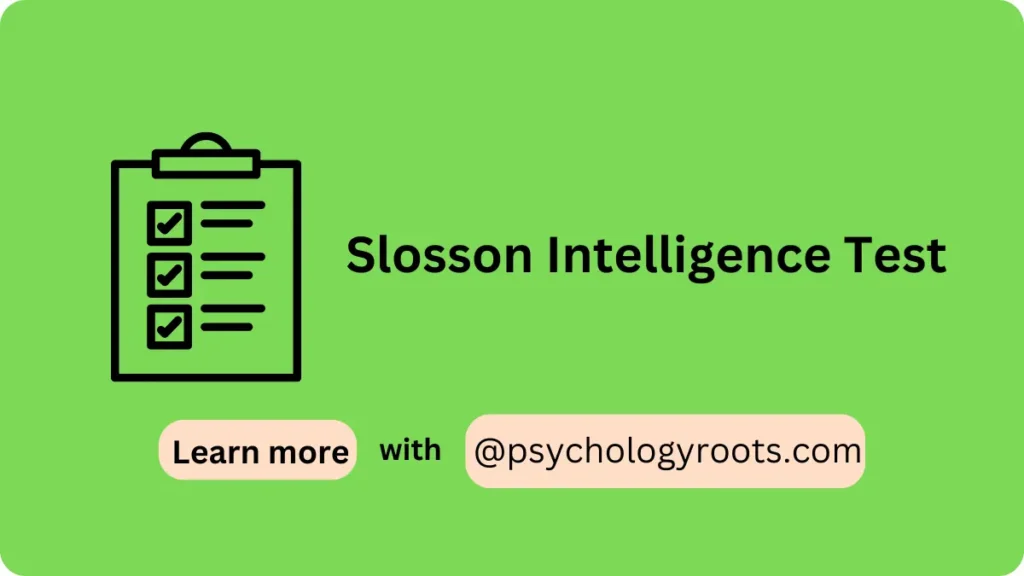Table of Contents
Slosson Intelligence Test
Here in this post, we are sharing the “Slosson Intelligence Test”. You can read psychometric and Author information. We have thousands of Scales and questionnaires in our collection (See Scales and Questionnaires). You can demand us any scale and questionnaires related to psychology through our community, and we will provide you with a short time. Keep visiting Psychology Roots.
About Slosson Intelligence Test
Scale Name
Slosson Intelligence Test
Author Details
Richard L. Slosson.
The 4th edition was revised by Bradley T. Erford, PhD, Sue L. Larson, PhD, and Steven W. Slosson.
Translation Availability
Not Sure

Background/Description
The Slosson Intelligence Test (SIT) is a widely used screening tool designed to quickly measure cognitive ability in both children and adults. The original test was developed in 1963 to provide a brief yet effective assessment of intelligence, particularly for individuals with visual impairments or reading disabilities. The fourth edition (SIT-4) includes updated normative data, revised items, and new features to enhance usability and accuracy.
The SIT-4 is primarily used in educational, clinical, and research settings to identify individuals who may require further psychological evaluation or educational support. The test measures crystallized verbal intelligence, making it suitable for individuals who may have difficulties with standard intelligence tests that rely heavily on visual or reading skills.
Administration, Scoring and Interpretation
- Preparation: Ensure the testing environment is quiet and free from distractions. Gather the test materials, including the administration manual, score sheets, and stimulus items.
- Introduction: Explain the purpose of the test to the examinee and provide instructions on how to respond to the items.
- Testing: Administer the test items verbally. The SIT-4 includes six subdomains: General Information, Comprehension, Quantitative, Similarities and Differences, Vocabulary, and Auditory Memory.
- Scoring: Simultaneously score the responses during administration. The test takes approximately 10-20 minutes to administer and 10 minutes to score.
Reliability and Validity
The SIT-4 has been demonstrated to have strong reliability and validity. The test-retest reliability is high, indicating that the test produces consistent results over time. The internal consistency reliability is also robust, ensuring that the items within each subdomain are measuring the same construct. Validity studies have shown that the SIT-4 correlates well with other established measures of intelligence, supporting its use as a reliable screening tool for cognitive ability.
Available Versions
Maltiple-Items
Reference
Khan, U. Q., Faran, M., & Zaman, N. I. (2022). Linguistic Validation of the urdu Translation of Slosson Intelligence Test SIT-4 (Vocabulary) Sub-test for Adults: An Educational Perspective. Eurasian Journal of Educational Research, 100(100), 48-59.
Slosson, R.L. et al. (no date) Slosson Intelligence Test-4th Edition, PAR. Available at: https://www.parinc.com/Products/Pkey/511 (Accessed: 22 July 2024).
Important Link
Scale File:
Frequently Asked Questions
What age range is the SIT-4 suitable for?
The SIT-4 is designed for individuals aged 4 to 65 years.
How long does it take to administer the SIT-4?
The test takes approximately 10-20 minutes to administer and 10 minutes to score.
What domains does the SIT-4 measure?
The SIT-4 measures six domains: General Information, Comprehension, Quantitative, Similarities and Differences, Vocabulary, and Auditory Memory.
Can the SIT-4 be used with individuals who have visual impairments?
Yes, the SIT-4 is verbally administered and includes features that make it suitable for individuals with visual impairments or reading disabilities.
Is the SIT-4 a standalone diagnostic tool?
No, the SIT-4 is a screening tool. It is typically used to identify individuals who may need further psychological evaluation.
What qualifications are required to administer the SIT-4?
Administrators should have a degree in psychology, counseling, speech-language pathology, or a related field, with coursework in test interpretation, psychometrics, and measurement theory.
Disclaimer
Please note that Psychology Roots does not have the right to grant permission for the use of any psychological scales or assessments listed on its website. To use any scale or assessment, you must obtain permission directly from the author or translator of the tool. Psychology Roots provides information about various tools and their administration procedures, but it is your responsibility to obtain proper permissions before using any scale or assessment. If you need further information about an author’s contact details, please submit a query to the Psychology Roots team.
Help Us Improve This Article
Have you discovered an inaccuracy? We put out great effort to give accurate and scientifically trustworthy information to our readers. Please notify us if you discover any typographical or grammatical errors.
Make a comment. We acknowledge and appreciate your efforts.
Share With Us
If you have any scale or any material related to psychology kindly share it with us at psychologyroots@gmail.com. We help others on behalf of you.